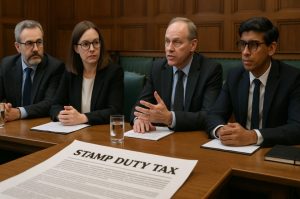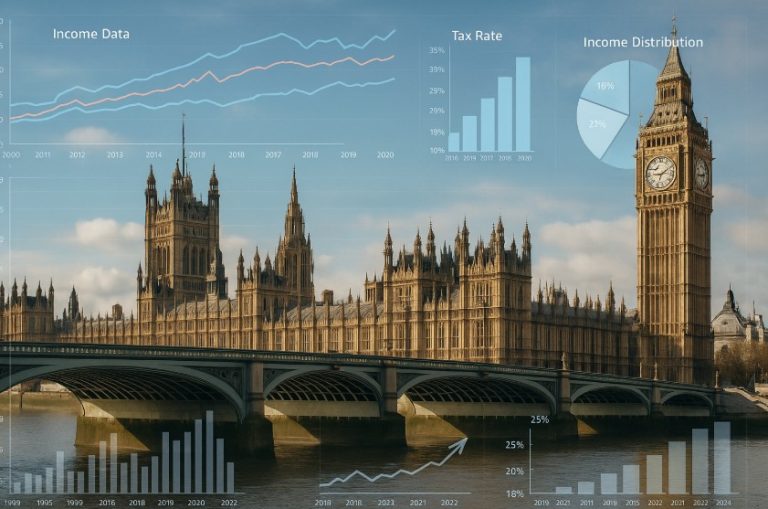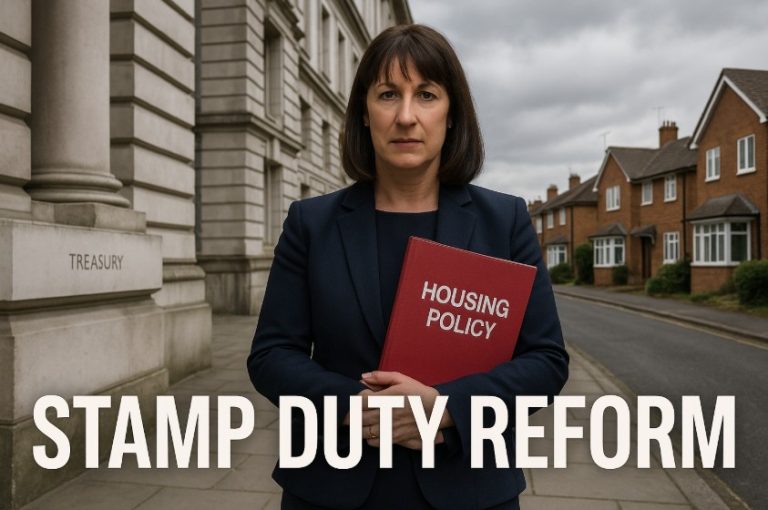As Rachel Reeves prepares for her first major budget as Chancellor, calls from property experts, economists, and industry leaders are intensifying. The focus? A controversial levy that has long burdened UK homebuyers Stamp Duty Land Tax (SDLT).
Labelled a “sin tax” by high-profile figures such as Kirstie Allsopp, stamp duty has become a flashpoint in the wider debate on housing reform, affordability, and economic mobility.
With the 26 November budget on the horizon, many are asking whether Reeves will take a bold step and abolish this tax in favour of a more equitable, long-term solution.
Why Are Property Experts Calling Stamp Duty a ‘Sin Tax’?

Property experts have increasingly referred to stamp duty as a “sin tax”, a term usually associated with levies placed on alcohol, tobacco and other products deemed socially harmful.
The use of this term in relation to property purchasing marks a dramatic shift in how stamp duty is perceived, particularly as it places financial penalties on an activity most consider economically beneficial.
Kirstie Allsopp, a prominent property expert and TV presenter, described the charge as punishing people for moving up the housing ladder.
She pointed out that purchasing a higher-value home results in a disproportionately high financial penalty, creating a disincentive for individuals to relocate even when necessary.
Experts argue this tax structure:
- Penalises aspirational behaviour such as upsizing
- Disincentivises economic mobility
- Adds to housing market stagnation by reducing transaction volumes
The framing of stamp duty as a sin tax reflects a growing belief that the UK government has mischaracterised property transactions, treating them not as contributors to economic growth but as activities to be restricted.
What Changes Is the Treasury Considering to the Current Property Tax System?
The Treasury has indicated that major changes to the property tax framework are being considered. These changes aim to make the tax system fairer, more progressive, and better aligned with current property values. One key proposal involves shifting from a one-off transaction tax to a recurring, annual charge.
Several potential reforms include:
- Replacing stamp duty with an annual property tax for homes worth over £500,000
- Revising council tax bands to reflect updated property valuations
- Introducing a mansion tax on properties exceeding £2 million
- Reviewing capital gains tax exemptions for main residences
These changes could reshape how property is taxed in the UK, with a stronger emphasis on ongoing contributions from homeowners instead of upfront transaction costs. For the Treasury, this also means creating a more reliable and predictable revenue stream.
How Does Stamp Duty Impact First-Time Buyers and the Housing Market?

First-time buyers are among the most affected by stamp duty. The upfront nature of the tax places a significant financial burden on those entering the housing market for the first time, often in addition to high deposits and mortgage fees.
Research by Zoopla shows that around 40% of first-time buyers outside London and 80% within the capital are required to pay stamp duty.
This cost often reaches tens of thousands of pounds in areas with high property values. The consequence is a delay in homeownership or a complete withdrawal from the buying process.
Stamp duty’s impact on the housing market includes:
- Lower transaction volumes as buyers delay purchases
- Fewer second-time buyers willing to move up the property ladder
- Increased pressure on the private rental sector
This ripple effect weakens housing mobility and contributes to broader affordability challenges across the market.
Would Abolishing Stamp Duty Help or Hurt the Property Market?
Abolishing stamp duty could stimulate market activity by reducing the barriers to buying a home. However, it also comes with risks. Removing the tax could fuel demand in high-value areas, particularly London and the South East, potentially leading to a sharp increase in property prices.
Economist Tim Leunig argues that stamp duty restricts people from moving to areas with better employment prospects or personal opportunities.
This lack of mobility not only affects individuals but has wider economic implications such as lower GDP and reduced tax revenue from other sources.
Potential Benefits of Abolishing Stamp Duty
- Increased housing transactions
- Improved labour market flexibility
- Greater access to housing for younger buyers
Potential Drawbacks
- Short-term inflation in property prices
- Loss of revenue unless adequately replaced
- Resistance from current homeowners if house prices increase rapidly
A balanced approach that phases out stamp duty while introducing a sustainable alternative could minimise these risks.
Could an Annual Property Tax Be a Fairer Alternative to Stamp Duty?

An annual property tax has been proposed as a more equitable solution that aligns with other forms of wealth-based taxation. Instead of a lump-sum charge at the point of purchase, an annual tax would distribute the financial responsibility over time and tie it more closely to long-term property ownership.
Tim Leunig proposed a model where homeowners would pay 0.54% of their property’s value annually. This would apply to homes valued over £500,000, with a higher rate for homes over £1 million. Under this system, someone purchasing a £500,000 property would pay £2,700 per year.
Comparison Between Stamp Duty and Proposed Annual Property Tax
| Property Value | Stamp Duty (Current System) | Annual Tax at 0.54% | Total After 5 Years |
| £500,000 | £16,000 | £2,700/year | £13,500 |
| £750,000 | £27,500 | £4,050/year | £20,250 |
| £1,000,000 | £43,750 | £5,400/year | £27,000 |
As the table shows, the annual property tax could offer better affordability over time, especially in the early years of ownership. It also reduces the barrier to entry, helping younger and lower-income buyers get on the property ladder.
What Are the Economic and Political Risks of Abolishing Stamp Duty?
Stamp duty contributes significant revenue to the Exchequer. Eliminating it without an effective alternative could leave a gap in funding for key public services. In 2022–2023, SDLT generated over £14 billion for the Treasury.
From a political standpoint, replacing stamp duty with an annual levy may face pushback from homeowners in higher-value regions, particularly those who are asset-rich but income-poor. The government would need to introduce exemptions or support schemes to protect these individuals.
Other economic and political risks include:
- Increased property speculation in the short term
- Regressive effects if annual tax rates are not well-calibrated
- Perceived unfairness if foreign-owned properties escape annual levies
To ensure fairness and effectiveness, any new property tax system must be accompanied by clear guidelines, valuations based on current market prices, and mechanisms for transparency and compliance.
How Does Stamp Duty Compare to Other UK Property Taxes?
The UK property tax landscape includes several overlapping levies, many of which are not well-aligned with modern property values or economic behaviour.
Overview of Key UK Property Taxes
| Tax Type | Description | Timing of Payment | Based On |
| Stamp Duty (SDLT) | One-time tax on home purchases | At time of purchase | Property value |
| Council Tax | Annual local tax for services | Annually | 1991 property valuations |
| Capital Gains Tax | Tax on sale of non-primary properties | At point of sale | Profit on sale price |
Each of these taxes addresses a different aspect of property ownership, but none offer a fully fair or up-to-date approach. Council tax, for instance, is still based on valuations from more than 30 years ago, while capital gains tax applies only in limited scenarios.
The proposed annual property tax seeks to create a more comprehensive and modern system that reflects actual wealth, rather than relying on outdated models or unpredictable transaction events.
What Do Industry Leaders and Economists Recommend Going Forward?

Experts across the property, finance, and economic sectors agree that the current system requires reform. Richard Donnell of Zoopla highlighted how stamp duty disproportionately affects first-time buyers, particularly in expensive urban areas.
Kate Willis from the Chartered Institute of Taxation acknowledged the administrative advantages of stamp duty—it’s simple to collect and difficult to avoid but also noted its distortive effects on market behaviour.
She and others suggest that a shift to a fairer, ongoing tax could improve economic outcomes without reducing public revenue in the long term.
Recommendations from industry leaders include:
- Phased replacement of stamp duty with a progressive annual tax
- Review and update of council tax bands to reflect real property values
- Safeguards for vulnerable homeowners, especially pensioners and low-income households in high-value properties
- Integration of capital gains tax policies to ensure tax consistency across property types
These recommendations reflect a desire for a tax framework that promotes housing mobility, supports first-time buyers, and ensures that tax liabilities are distributed according to actual property wealth.
Conclusion
The growing chorus of voices calling for the abolition of stamp duty reflects a widespread recognition that the current system is broken.
As the Chancellor faces one of the most anticipated budgets in recent memory, the decision to either reform or retain SDLT will signal the direction of Labour’s broader economic and housing policy.
While eliminating stamp duty won’t solve the housing crisis on its own, it could unlock economic mobility, increase homeownership, and create a fairer playing field for all buyers.
If paired with a well-structured annual property tax, this reform could mark the beginning of a more equitable and sustainable approach to property taxation in the UK.
FAQs
What is the current threshold for paying stamp duty in the UK?
As of 2025, stamp duty is paid on residential property purchases above £125,000 in England and Northern Ireland, with rates increasing based on the value of the property.
How much revenue does stamp duty generate for the UK government annually?
Stamp duty typically generates between £10 billion and £15 billion annually, making it a significant source of government income.
What impact would an annual property tax have on landlords and investors?
An annual tax could increase ongoing costs for landlords and investors, potentially affecting rental yields. However, it may also encourage long-term investment over short-term speculation.
Why is stamp duty seen as a barrier to labour mobility?
Stamp duty discourages people from relocating due to high upfront costs, limiting their ability to move for work opportunities or family reasons. This can reduce overall productivity and GDP.
Has any UK government previously tried to abolish stamp duty?
While reforms have been made such as temporary holidays and thresholds being raised—no government has completely abolished stamp duty to date, though it has been debated frequently.
What is a mansion tax and how does it differ from stamp duty?
A mansion tax is an annual levy on high-value properties, typically those worth over £2 million. Unlike stamp duty, which is a one-time cost, the mansion tax would recur yearly.
Are there property tax systems in other countries that work better than the UK’s?
Countries like Germany and the Netherlands rely more on annual property taxes rather than transaction-based charges, resulting in more stable housing markets and greater affordability.






